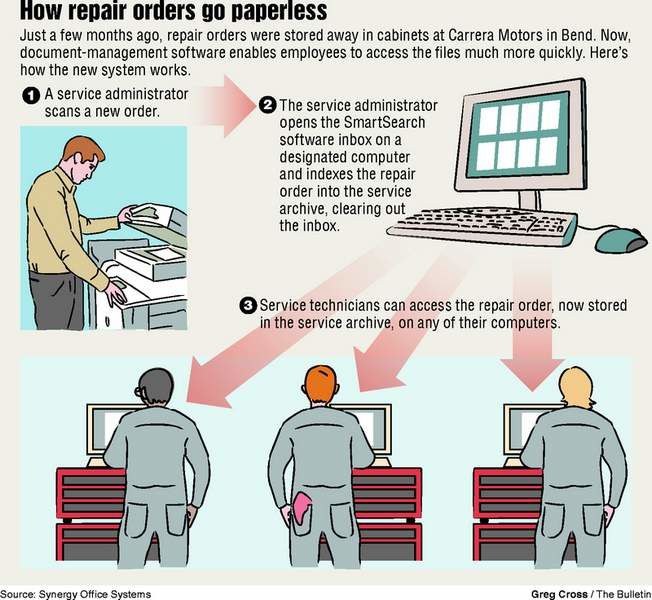Bend business digitizes documents
Published 4:00 am Monday, November 21, 2011

- Bend business digitizes documents
Nine months ago, employees at Carrera Motors in Bend stored repair orders printed on paper in file cabinets that took up whole offices.
Now they scan and convert each and every repair order into a digital record stored in an archive.
If a repeat customer stops by the Porsche, BMW, Volkswagen and Audi dealership at 1045 S.E. Third St., a service department technician can pull up a car’s files on a computer screen in a matter of moments.
“If I have a tech out there, turning wrenches, he’s making money,” said Richard Grant, the dealership’s service director. “If he is having to dig through sometimes large files, he’s not getting paid for that.”
Making the dealership’s service department paperless, Grant estimated, has made service technicians about 20 percent more efficient in terms of time management.
Carrera stands out in Central Oregon for its move toward going paperless with what’s generally called document-management software.
While some companies have seen benefits to making the transition, others the world over have held off, citing potentially high costs of hardware and software or the old if-it-ain’t-broken-don’t-fix it argument, said Jeff Randolph, marketing director of ARMA International, a not-for-profit association based in Kansas that promotes record management.
“I think you’ll … find there are some organizations that (say they ) ‘have always done it this way, and it’s working for us, and we don’t need to change at this point in time,’” Randolph said.
Medical offices across the country have been moving quickly toward digitizing medical records, thanks to cash incentives from Medicare and Medicaid.
Not every type of business is keeping up, though.
“A lot of other industries are hesitant, because it’s new, and they just don’t know how they can make it work within their offices,” said Joanna Boise, the service center manager at Moonlight Business Process Outsourcing Inc. in Bend. She oversees the company’s document-management component, which resells software and hardware and also photocopies and organizes documents for companies.
Clients range from banks — one asked Moonlight to digitize loan documents — to construction companies — one wanted digital versions of blueprints.
While buying document-management software can be expensive, the move can save money later, said Tyrene Bada, president of the Oregon chapter of ARMA International.
“I like to think everyone is moving in that direction. Whether they’ve actually gotten there is a different question,” said Bada, who is developing a new records-management system for Portland Community College.
Earlier this year, Synergy Office Systems of Bend sold SmartSearch software to Carrera Motors. A Connecticut company called Square 9 Softworks LLC produces SmartSearch.
The software and equipment associated with it, such as servers, cost less than $20,000, Grant said.
It’s hard for Grant to determine whether Carrera has yet seen a complete return on its investment, but he’s sure the change has freed up employees’ time, not to mention space.
“We’ve gotten our offices back,” he said.
With paper records, it took four or five hours for a technician to add repair orders, he said.
“She can now do it in an hour and take care of the prior day’s business in one hour,” he said, opening up three or four hours for other work.
Bob Browning, who runs Synergy in northeast Bend, said among his company’s clients, Carrera is an exception to the rule.
Hundreds of clients have paid for copy machines that scan a document and allow it to be sent digitally, as an email, for example, or to a computer file folder.
But few clients have taken the next step and purchased powerful document-management software, such as the kind at Carrera Motors, he said,that allows quick retrieval of digital records.
“I’m trying to help customers move to the next level,” Browning said.
At the Bend law firm Karnopp Petersen LLP, employees use two kinds of software: one that works with photocopiers to turn paper documents into text-searchable digital format, and one that groups files associated with one another.
The firm bought the former software, called eCopy ShareScan, from Synergy.Nuance Communications Inc. in Massachusetts developed it.
“Smaller (companies) probably don’t go through the expense of purchasing that kind of software, …,” said Karnopp’s technology and facilities manager, Dharma Chappell.
“But the larger your firm is, the more documents they have and the more complex things get, the more difficult it is to manage all these documents.
“It’s very handy to have a centralized system.”
Central Oregon Radiology Associates PC in northeast Bend has digitized general business records, such as personnel data and meeting minutes, for several years, said Marico Oliviera, director of human resources. It’s become easier to retrieve documents that would ordinarily be scattered, she said.
Before the change, she said, the company used to have employees so skilled at finding records sitting on desks that they were called sleuths, she said.
Will the company ever go back to keeping only hard copies of files?
“Oh my gosh, no,” Oliviera said.






